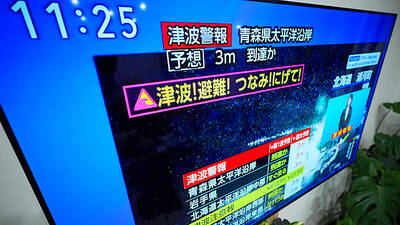Japan urged Beijing yesterday to take steps towards nuclear disarmament, to strictly control exports of missile technologies and to disclose military data to allay its neighbors' fears.
Japan's Foreign Ministry issued the diplomatic requests at a time when ties between the two Asian powers have been strained by a range of simmering disputes, many stemming from Japan's invasion and occupation of parts of China from 1931 to 1945.
In a report on disarmament and nuclear non-proliferation, the ministry said information on China's military remained "opaque."
"We believe that it is important for China to improve transparency regarding its military in order to clear fears held by its neighboring countries," the report said.
China, whose 2.3-million-strong People's Liberation Army is the world's largest standing military, has been steadily moving to modernize its nuclear arms and missile capabilities as well as its naval and air forces, Japan's Foreign Ministry said.
China said on Saturday that its official defense budget would rise to 283.8 billion yuan (US$35 billion) this year, up 14.7 percent from last year. The country's military spending has risen by double-digit percentages for the last few years.
US and Japanese defense officials and many defense analysts have said that Beijing in fact spends much more on military equipment and forces than the official budget shows.
As a result, Japan has grown increasingly outspoken and nervous about China's military buildup and has repeatedly called on Beijing to disclose information on its military.
In December, Japanese For-eign Minister Taro Aso caused a diplomatic flap when he said China's military buildup was a threat given its lack of transparency, triggering an angry retort from Beijing and straining already chilly bilateral ties.
nuclear risks
Yesterday's report said that China, which has intercontinental ballistic missiles that put the west coast of the US within range, should follow the other four nuclear powers -- the US, Russia, Britain and France -- and declare a moratorium on production of fissionable material.
"Although China has shown its intention to push ahead with nuclear disarmament, no progress is believed to have been made in specific nuclear arms reduction steps in the past 20 years," it said.
China has taken legal steps to curb exports of sensitive materials and technologies since 2002, but it should do more to completely halt shipments abroad of materials that could be used to produce weapons of mass destruction, it said.
"We hope China will enforce strict export controls," the report said.
The US said in December that it had imposed sanctions on six Chinese state-run firms for selling missiles or chemical weapons supplies to Iran.
territorial dispute
Meanwhile, China and Japan wrapped up two-day negotiations on disputed gas deposits in the East China Sea and agreed to meet again in an ongoing effort to resolve the territorial disagreement, the Chinese government said.
"The two sides exchanged in-depth views ... and agreed to hold a next round of consultation as soon as possible," the official Xinhua News Agency said.
It did not say when or where the talks would take place.
Japanese officials were hoping for a response from China to Tokyo's proposal for joint development of the deposits. The Xinhua report did not give details on what China's position was but said discussions were "pragmatic and constructive."
Kenichiro Sasae, head of the Japanese Foreign Ministry's Asia-Oceania Bureau, and his Chinese counterpart, Hu Zhengyao (

PARLIAMENT CHAOS: Police forcibly removed Brazilian Deputy Glauber Braga after he called the legislation part of a ‘coup offensive’ and occupied the speaker’s chair Brazil’s lower house of Congress early yesterday approved a bill that could slash former Brazilian president Jair Bolsonaro’s prison sentence for plotting a coup, after efforts by a lawmaker to disrupt the proceedings sparked chaos in parliament. Bolsonaro has been serving a 27-year term since last month after his conviction for a scheme to stop Brazilian President Luiz Inacio Lula da Silva from taking office after the 2022 election. Lawmakers had been discussing a bill that would significantly reduce sentences for several crimes, including attempting a coup d’etat — opening up the prospect that Bolsonaro, 70, could have his sentence cut to

A powerful magnitude 7.6 earthquake shook Japan’s northeast region late on Monday, prompting tsunami warnings and orders for residents to evacuate. A tsunami as high as three metres (10 feet) could hit Japan’s northeastern coast after an earthquake with an estimated magnitude of 7.6 occurred offshore at 11:15 p.m. (1415 GMT), the Japan Meteorological Agency (JMA) said. Tsunami warnings were issued for the prefectures of Hokkaido, Aomori and Iwate, and a tsunami of 40cm had been observed at Aomori’s Mutsu Ogawara and Hokkaido’s Urakawa ports before midnight, JMA said. The epicentre of the quake was 80 km (50 miles) off the coast of

China yesterday held a low-key memorial ceremony for the 1937 Nanjing Massacre, with Chinese President Xi Jinping (習近平) not attending, despite a diplomatic crisis between Beijing and Tokyo over Taiwan. Beijing has raged at Tokyo since Japanese Prime Minister Sanae Takaichi last month said that a hypothetical Chinese attack on Taiwan could trigger a military response from Japan. China and Japan have long sparred over their painful history. China consistently reminds its people of the 1937 Nanjing Massacre, in which it says Japanese troops killed 300,000 people in what was then its capital. A post-World War II Allied tribunal put the death toll

A passerby could hear the cacophony from miles away in the Argentine capital, the unmistakable sound of 2,397 dogs barking — and breaking the unofficial world record for the largest-ever gathering of golden retrievers. Excitement pulsed through Bosques de Palermo, a sprawling park in Buenos Aires, as golden retriever-owners from all over Argentina transformed the park’s grassy expanse into a sea of bright yellow fur. Dog owners of all ages, their clothes covered in dog hair and stained with slobber, plopped down on picnic blankets with their beloved goldens to take in the surreal sight of so many other, exceptionally similar-looking ones.